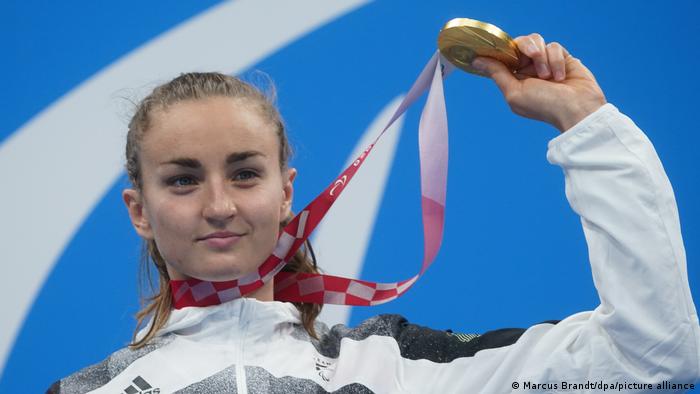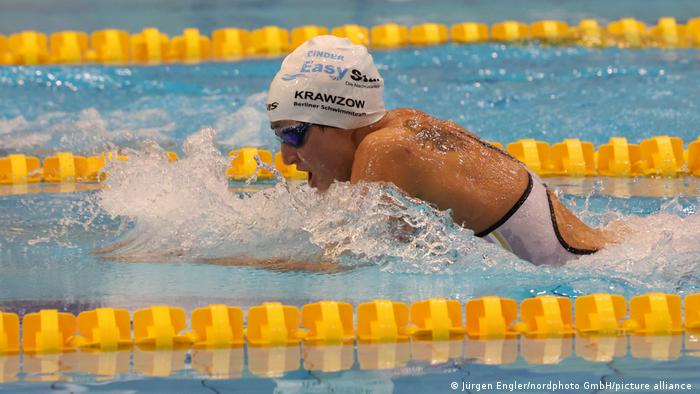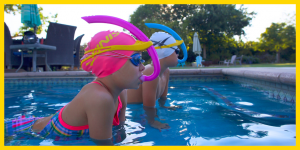Elena Semechin: swimming despite chemotherapy
Thomas Klein, DW.com
June 9, 2022
Elena Semechin won gold at the Paralympics last year. It is the most successful year in the almost blind swimmer’s career. But then she gets a diagnosis that turns her life upside down.
It is the last turning point for Elena Krawzow – as she was then called – in the final race over 100 meters breaststroke at the Paralympics in Tokyo. The almost completely blind swimmer is about a second behind Brit Rebecca Redfern. It’s exciting. Krawzow fights and gets closer and closer to her competitor. Only in the last few meters does the 27-year-old pass and is the first to hit the edge of the pool. The Kazakh native wins gold with a lead of 0.64 seconds.
It is her first win at the Paralympics after winning silver over the same distance in London 2012. “That was the last medal I was missing,” the athlete recalled in a DW interview. “After ten years of hard work, a real load has been lifted from my shoulders.” Krawzow had previously won titles at European and World Championships and also improved the world record on their parade route. With gold at the Paralympics, however, the swimmer has reached the peak of her career.
“Many athletes fall into a hole after a title like that. That wasn’t the case for me at all. I had a wonderful time afterwards and really enjoyed it,” she reports. “The only reason I couldn’t enjoy every day was the headache that was plaguing me.”
“When can I train again?”
Krawzow is being examined and is waiting for a message from her doctors. On the day she was diagnosed, she and her fiancé were choosing their wedding rings. She then drives to the MRI scan. “After the initial diagnosis, it was clear that something was wrong. And after further examination, I was then told that there was a brain tumor in my head. Of course, that was a blow.”

Suddenly life was different, she says. “There was no longer any joy, happiness or euphoria, but fear and uncertainty. I didn’t know what to expect.” Krawzow cancels all appointments and makes her illness public. “I didn’t want to hide it. I didn’t want people asking me weird questions,” she says. “That helped me a lot. I was in good control of myself and I think I handled it very well.”
In early November, two days before the operation, Kravtsov married her longtime coach Philip Semechin and changed her last name. Marriage and surgery mark a turning point in the life of the competitive athlete. And after the brain tumor has been removed from her head, she looks straight ahead again. Giving up was and is not an issue for the now 28-year-old. She wants to get back in the pool as soon as possible. “After the operation I woke up and immediately asked the doctor when I could train again.”
Training and chemotherapy run in parallel
Just a week later, she begins rehab and chemotherapy. At first, Semechin, as she is now called, only trains outside of the pool because the surgical scar hasn’t completely healed yet. “Competitive sport helped me a lot in this phase because my body is used to being extremely stressed. I learned early on what it means to push your limits physically and mentally. I benefit a lot from that,” says Semechin. Your fighting spirit is awakened.
Together with her trainer and husband, she adapts her training plans. More recovery phases “so that I don’t completely destroy myself and then can’t stand the chemo anymore”. More than ever, Semechin has to listen to her body. The cycles of chemotherapy are different. Sometimes she can train more and sometimes less, she says. “Finding this balance between relaxation and stress and to regulate my sporting ambition down a bit” is the biggest challenge in the current situation.

Only five months after the brain tumor was removed, Semechin is at the start of the German Championships in Berlin. She just finished another chemo cycle. “I was a little scared,” she reports in an interview with ZDF. “I felt really bad. I was in bed and I was sick. I hadn’t eaten. But I thought this is the only competition before the World Cup where you can swim again.”
Semechin makes it to the finals and ends up in last place in the finals, but it feels like a win. “The goal was that the lifeguard didn’t have to fish me out of the water,” she says and is happy: “I was totally relieved that I can still swim at all.”
Big goals for the future
In May, Semechin flies to a training camp in Turkey to prepare for the World Cup in Portugal in June. The chemotherapy runs parallel to the training phases, but the 28-year-old accepts the challenge in an impressive way. Already at the age of seven she had to accept that her life would change. At that time, she was diagnosed with Stargardt’s disease, the disease that caused her vision to progressively disappear. “The fact that this diagnosis has now come about would perhaps tear the rug out from under the feet of many other people, but I saw it as a sign that you have to live in moments,” she says. “I’m enjoying life maybe even more now than before the diagnosis.”
Semechin: “Maybe there is no later”
Semechin will have to live with the cancer because she has not yet conquered the disease. She doesn’t know how long she will live – but that doesn’t matter at the moment, she says. “I live in the here and now and don’t push anything away. Of course, competitive sport still plays a big role in my life, but if I want to get a diving license, for example, then I’ll do it and take the time for it.” Semechin. “I’m planning it now, because maybe there’s no later.”
But your sporting goals remain. The World Championships in Portugal should be the first big competition and then the swimmer would like to start at the Paralympics in Paris in 2024 and repeat her success in Tokyo. However, everything depends on the further course of the cancer treatments. “If I hope to get over the disease at some point, I would like to have a child,” she says, adding: “I want to leave someone there in case I die earlier. I want my family not to be completely alone then.”
Editor’s note: Elena Semechin just missed out on her third world championship title at the World Championships in Madeira. In the 100m breaststroke, she finished second, 0.02 seconds back, and won silver.
Recent Articles
Dylan Carter
Chelsea Hodges
Lorenzo Zazzeri

Introducing the Stability Snorkel Jr
Share on Social Media


